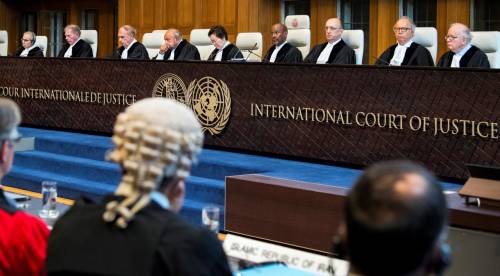The International Court of Justice in The Hague, Netherlands, has faulted the dismissal of Fidelia Onoghaife, the whistleblower who exposed Dutch Ambassador to Nigeria, Robert Petri.
Onoghaife, a Nigerian-British, who was the Senior Policy Advisor of Economic and Political Affairs at the Dutch Embassy in Nigeria, was sacked after revealing how Petri leaked confidential information about an extensive corruption investigation into the operation of Shell to the oil company.
To hide her dismissal, the Dutch Embassy alleged that she was high-handed in her behaviour and unpopular with staff.
Onoghaife dragged the matter to The Hague to rule on her sack.
Delivering judgment on the case, The Hague faulted the Dutch Embassy, saying “the Ministry of Foreign Affairs has falsely fired her”.
After revealing the corrupt activities of Petri, the ministry promised Onoghaife that she would be protected as a whistleblower.
Following its integrity reports, the ministry sent an investigation team to Abuja, which was later followed by an investigation into “management problems” at the embassy.
Ambassador Petri was brought back to the Netherlands prematurely as a result of these investigations.
He got a position in The Hague and kept his job and salary.
Onoghaife, on the other hand, was fired shortly afterwards.
According to the ministry, this had nothing to do with her whistleblower report but was due to her part in the bad working atmosphere at the embassy.
The judge dismissed that suggestion in the ruling.
“It has been sufficiently established that the dismissal of the employee is related to the whistleblower report made by her,” said the judgment.
The judge also blames the ministry for repeatedly waving a report on the abuses in Abuja in which large parts had been made illegible.
Onoghaife’s attorney, Christian Oberman, says the former embassy employee was “very satisfied” with the verdict especially since “the court found that she was fired for her whistleblower report”.
“She feels that justice has been done and that she has been cleared of all blame,” Overman said.
She will receive compensation of two years salaries.
Onoghaife was supported in her fight by a large number of NGOs, who are concerned about the way the Dutch Government deals with Shell.
Donald Pols, Director of Milieudefensie, says in a response, “The ruling confirms the image that the Dutch Government is overshooting in its desire to facilitate Shell and other multinationals and is prepared to fire critical officials for this. We find this disturbing.
“It cannot be the case that a country such as the Netherlands, which attaches great importance to the international legal order, will dismiss an internal whistleblower. While the ambassador in Nigeria – whose integrity is under discussion – will be given a different position,”says Tuur Elzinga, Vice Chairman of the FNV trade union.
A coalition of international rights groups expressed backing and support for Onoghaife as they called on the Nigerian Government to protect her.
The groups want the Federal Government to invite the Dutch Ministry of Foreign Affairs to explain why Onoghaife was sacked despite having been promised that her job was safe after reporting Petri’s breach of confidentiality, invite the current Dutch Ambassador to explain the actions and implications of the actions his predecessor Petri and the Dutch Government’s silence on the matter.
“We urge you to strongly consider suspending the Memorandum of Understanding on Bilateral Consultations between Nigeria and the Netherlands signed in 2018 and the 2019 agreements signed during the Dutch Prime Minister’s visit to Abuja in 2019.
“This dutiful and patriotic Nigerian was sacked by the Dutch Embassy for performing her civic duty. It is unfortunate that she has been left to carry her cross all lone,” HEDA said in the petition jointly signed by its Chairman, Olanrewaju Suraju; Dr Godwin Ojo, ERA/FoE; Nicholas Hildyard, The CornerHouse; Simon Taylor, GlobalWitness; and Luca Manes of Re:Common and sent to Onyeama.
The groups said Nigeria cannot and should not look on when one of its citizens was being so shamefully abused.
According to the groups, Nigeria has also been treated with disdain, adding that a relationship between two governments is always based on element of trust and this element had been violated.
They said that information sharing between Nigeria and the Netherlands was critical to fighting corruption and to promoting common interests.
SAHARA REPORTERS


